新概念英语第一册第29-30课Come in,Amy
英语说课Come in,Amy!
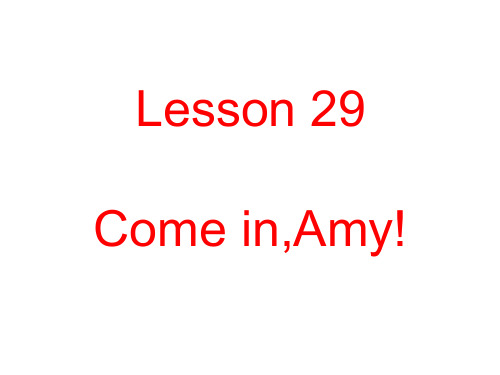
How must Amy clean the floor?
untidy
This bedroom's very untidy.
What must I do?
1
Open the window and air the room
2 put the clothes in the wardrobe
3 make then,Amy!
说教材
我所要讲的新概念第一册第29课的内容。
内容:本次课的重点内容是祈使句的用法, 动介短语的用法和情态助动词的用法。
意义:新一前28课主要讲的是含有Be动词 的主系表结构的句子,L29开始重点突出动 词的用法,动宾结构的用法。通过本课的 学习为以后学习含有动词的各种时态打下 基础.
• You can ask somebody to do
something
• You can only ask somebody to
put sth somewhere
• put up your hand • put up your hands • put on your coat • take off your hat • put off our meeting
说教法 本节课采用任务型教学法,分组教学法,情境 教学法,让学生直观感知祈使句的语气。
说学生 本节课针对五年级学生设计,五年级作为小升 初的一个夯实基础的阶段,所以在语法的学习 中,采用了学生乐于接受的情景教学法让孩子 直接感知这些语法,加强学生的记忆,也符合 现阶段学生的认知规律。
教学目标 知识目标:掌握本课出现的单词和动词短语 及情态助动词must的用法 能力目标:能够熟练运用祈使句和情态动词
• Don't be late! • Don't smoke!
裕兴新概念学习笔记 第一册(29-30)
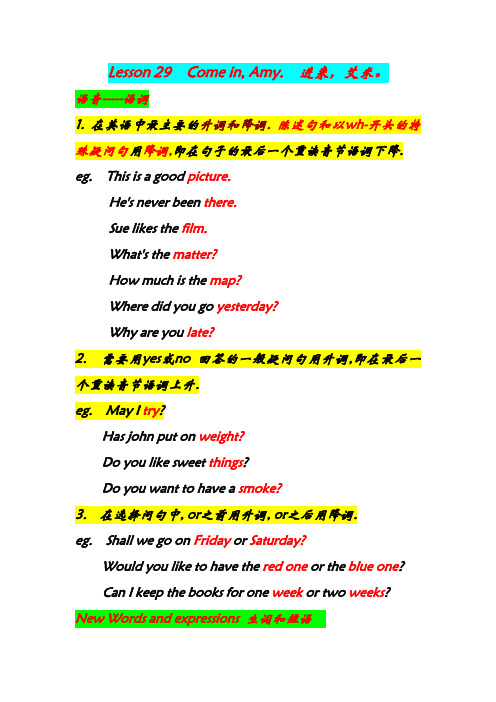
Lesson 29 Come in, Amy. 进来,艾米。
语音-----语调1. 在英语中最主要的升调和降调.陈述句和以wh-开头的特殊疑问句用降调,即在句子的最后一个重读音节语调下降. eg. This is a good picture.He's never been there.Sue likes the film.What's the matter?How much is the map?Where did you go yesterday?Why are you late?2. 需要用yes或no 回答的一般疑问句用升调,即在最后一个重读音节语调上升.eg. May I try?Has john put on weight?Do you like sweet things?Do you want to have a smoke?3. 在选择问句中, or之前用升调, or之后用降调.eg. Shall we go on Friday or Saturday?Would you like to have the red one or the blue one?Can I keep the books for one week or two weeks? New Words and expressions 生词和短语shut v. 关门bedroom n. 卧室untidy adj. 乱,不整齐must modal verb 必须,应该open v. 打开air v. 使…通风,换换空气put v. 放置clothes n. 衣服wardrobe n. 大衣柜dust v. 掸掉灰尘土mop n. 拖把sweep v. 扫shut v. 关门close v. 关shut the door/ close the door 关上门shut the window /close the window 关上窗户shut up! 闭嘴bedroom n. 卧室living room n. 客厅= sitting room kitchen n. 厨房toliet n. 厕所dining room n. 餐厅study n. 书房balcony n. 阳台basement n. 地下室bathroom n. 卫生局,洗澡间untity adj. 乱, 不整齐un 前缀具有否定意思tidy 整齐的untidy 乱,不整齐happy 快乐的, 幸福的unhappy 不快乐的,不高兴的fair 公平的unfair 不公平的fortunately 幸运地fortune 运气/fortunate 幸运的unfortunately 不幸运地must modal verb 必须,应该情态动词can 能够,会should 应该may 可以,可能情态动词没有人称和数的变化,含有情态动词的句子,其否定句是在情态动词后面加not, 疑问句是把情态动词提前.eg. You must shut the door.你必须关门.He must open the window.他必须打开窗户.They must look at the blackboard.他们必须看黑板.We must go to school.他们必须去上学.否定句是在must后面加not.must not = mustn't 决不能,决不可以eg. She must not open the window.她决对不可以开窗户.You must not play with fire.你们千万不要玩笑.They mustn't watch TV.他们不可以看电视.She mustn't go out.她不可以出去.疑问句是把must 前提,肯定回答: Yes, 主+ must.是的,必须否定回答: No, 主+needn't不,不必了-----Must we go to school?我们必须去上学吗?Yes, you must.是的,必须Must they clean the room?你们必须打扫房间吗?No, they needn't.不,不必了.Must we copy these letters?我们必须抄这些信件吗?No, you needn't不,不必了.Must she answer the question?她必须回答这个问题吗?Yes, she must.是的,必须.No, she needn't不,不必了.open adj. 开着的反义词shut或closeopen minded: 开明的,愿意考虑不同意见和想法的eg. My mother is open-minded.我的妈妈思想很开明.open v. 打开open your mouth 张开你的嘴opening time: 开放时间,营业时间air1. v. 使...通风,换换空气air the room 给房间通风1.n. 空气(不可数名词)eg. Let's go out and breathe some fresh air.咱们出去呼吸一些新鲜空气吧!air bed 气垫air mattress 充气床垫air-conditioner 空调put v. 放置put sth +介词短语把...放在... 地方eg. Put your coat on the chair.把你的外套放在椅子上.Put these boxes on the floor.把这些箱子放在地板上.clothes n. 衣服clothes hanger 衣服挂clothes horse 晾衣架(室内) clothes line 晾衣绳clothes peg (Br) 衣架clothes pin (Am) 衣架clothes tree 衣帽架,放衣架wardrobe n. 大衣柜eg. There are some clothes in the wardrobe.有一些衣服在衣柜里.Put these boxes on the floor.把这些箱子放在地板上.dust1. v. 弹掉灰尘dust the dressing table.弹掉梳妆台上的灰尘.2. n. 灰尘(不可数名词)eg. There is some dust on the desk.在书桌上面有些灰尘.sweep v. 扫sweep the floor 扫地TEXT 课文Listen to the text and answer the question:What must Amy do to clean the room?艾米应该做什么来整理房间呢?How must Amy clean the floor? Sweep it.艾米需要如何来清扫地面?扫地MRS. JONES: Come in, Amy.琼斯夫人:进来,艾米。
新概念英语单词第1册Lesson29:come in,Amy
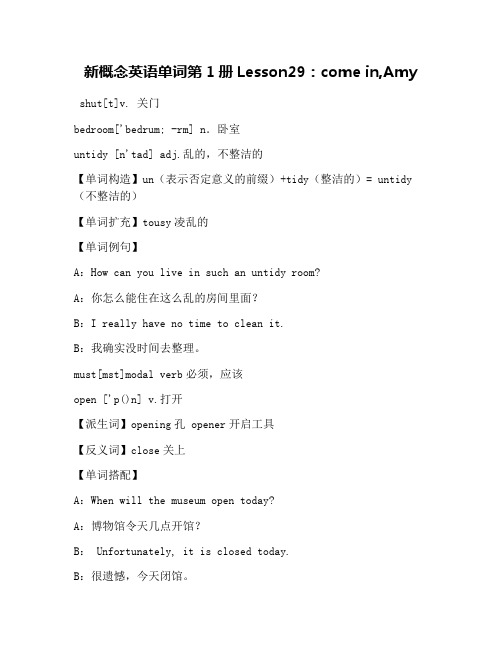
新概念英语单词第1册Lesson29:come in,Amy shut[t]v. 关门bedroom['bedrum; -rm] n.卧室untidy [n'tad] adj.乱的,不整洁的【单词构造】un(表示否定意义的前缀)+tidy(整洁的)= untidy (不整洁的)【单词扩充】tousy凌乱的【单词例句】A:How can you live in such an untidy room?A:你怎么能住在这么乱的房间里面?B:I really have no time to clean it.B:我确实没时间去整理。
must[mst]modal verb必须,应该open ['p()n] v.打开【派生词】opening孔 opener开启工具【反义词】close关上【单词搭配】A:When will the museum open today?A:博物馆令天几点开馆?B: Unfortunately, it is closed today.B:很遗憾,今天闭馆。
air[e] v.使……通风,换换空气put [pt] v.放置【单词搭配】put on穿上 put up举起 put off推迟 put out扑灭【单词例句】A:Put it in that corner, please.A:请把它放到那个角落去。
B:I can't lift it. It's so heavy.B:我提不动,它太重了。
clothes [kl(ð)z]n.衣服wardrobe ['wdrb] n.衣柜dust[dst] v.弹掉灰尘【派生词】dusting清扫 dustless无尘的【单词例句】A:Please dust the shelves.A:请掸掸柜子上的灰。
B:OK. I'Il finish it soon.B:好的,马上完成。
新概念英语第一册Lesson2930ComeinAmy小学英语初中英语全国通用
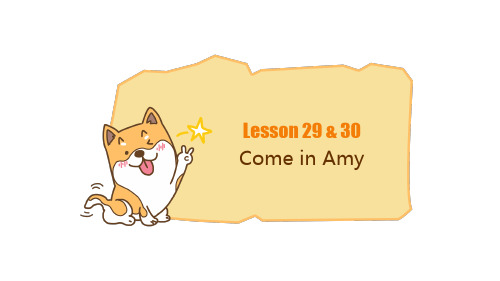
同学们 , 请对照教材听老师讲解! air the room : 给房间通风换气
air : v. 给…通风换气 n. 空气
Language Point
语句讲解、课文讲解
同学们 , 请对照教材听老师讲解!
then : th发 [ð] adv. 然后,接着 e.g. 先买菜,再做晚饭。
open : adj. 开着的 , 营业的
shut : v. 关上
open : v. 打开
e.g. Shut / Open the door. → 祈使句
Language Point
语句讲解、课文讲解
表示礼貌 , 后面加一个逗号 , 然后加please. e.g. Shut the door / window, please. shut作动词时 , 还有一个近义词close e.g. Shut the door / window, please.
做个小练习 巩固一下吧~
"祈使句比较特殊 , 经常省略动作的主语。 ”这种说法对不对?
A. no
B. yes
查看答案解析
答案:yes 解析: 考查祈使句。 祈使句特点: 1.省略主语 2. 直接使用动词原形;
下一题
根据句意填空。 The milk bottle is not clean. _________ it please.
Language Point
语句讲解、课文讲解
empty : adj. 空的 e.g. This bottle is empty. empty : v. 把… 倒空 e.g. Empty the bottle / box.
an empty bottle
有形容词,同时含有动词含义的词 : clean, shut, open, empty e.g. The cup isn't empty. Empty it!
新概念一第29课 come in amy

How can we get a clean bedroom?
open the window air the room
put the clothes in the wardorbe make the bed dust the dressing table sweep the floor
新概念的教学目标
祈使句:用于表示请求、命令、建议、 等的句子,常以动词开头, 省略主语。
eg:Open the book; Sit down;
No smoking.
listen to my order!
Touch your head Put up your hands Close you eyes Turn left
新概念英语公开课
1.Are you a lazy(懒惰的) kid? 2.Do you often clean your bedroom?
Lesson 29
Come in,Amy?
Watch the video,then answer the questior
untidy adj. 不整齐 un-前缀,表示否定 happy- unhappy friendly- unfriendly
This bedroom is untidy.
What must I do?
open the window
air the room
air conditioner
clothes n.衣服
1.能够进行日常对话; 2.提高阅读能力及写作水平; 3.词汇量的积累,达到1000词以上; 4. 掌握英语中的基本语法、词法、句法及句型结构. (为小升初做准备)
新概念的教材特点
严密的体系性、严谨的科学性、精湛的实用性、浓郁的 趣味性
新概念英语第一册Lesson-29-30课 Come in ,Amy

练一练: 他应该做什么? What must he do? 他应该开窗给房间通风。 He must open the window and air the room.
他们应该干什么? What must they do? 他们应该把衣服放到橱柜里。 They must put the clothes in the wardrobe.
n.灰尘
6. sweep [swi:p] v. 扫 扫地 sweep the floor
1)肯定句
2)否定句:主语+mustn’t+动词原形 你不应该关门。 You mustn’t shut the door.
一般疑问句:Must+主语+动词原形 我应该关门吗? Must I shut the door? 肯定回答: Yes, you must. 否定回答: No, you needn’t.
{ Read this
newspaper magazine
What must I do? Sharpen these
pencils
语法:以动词原形开头的祈使句
1. 祈使句常常是表达说话人对对方的劝告、 叮嘱、请求或命令等。
2.在表达请求或劝告时,在祈使句前或句末 可加上please,以使句子的语气更加缓和 或客气。 Open the window, please. Come in, please.
三、选择题。
• ( C)1.The door is open. You must ____ it.
•
A. open B. opens C. shut D. shuts
(完整版)新概念英语一册29-30课习题
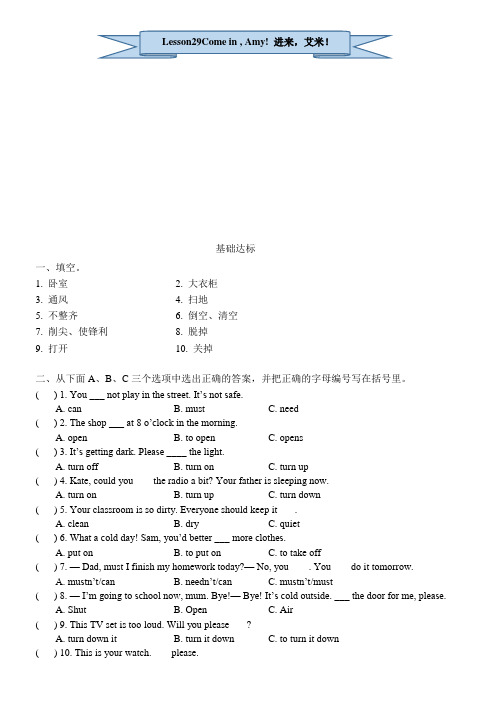
基础达标一、填空。
1. 卧室 _________________2. 大衣柜____________________3. 通风 _________________4. 扫地______________________5. 不整齐 _______________6. 倒空、清空________________7. 削尖、使锋利 _________ 8. 脱掉______________________9. 打开 _________________ 10. 关掉_____________________二、从下面A、B、C三个选项中选出正确的答案,并把正确的字母编号写在括号里。
( ) 1. You ___ not play in the street. It’s not safe.A. canB. mustC. need( ) 2. The shop ___ at 8 o’clock in the morning.A. openB. to openC. opens( ) 3. It’s getting dark. Please ____ the light.A. turn offB. turn onC. turn up( ) 4. Kate, could you ___ the radio a bit? Your father is sleeping now.A. turn onB. turn upC. turn down( ) 5. Your classroom is so dirty. Everyone should keep it ___.A. cleanB. dryC. quiet( ) 6. What a cold day! Sam, you’d better ___ more clothes.A. put onB. to put onC. to take off( ) 7. — Dad, must I finish my homework today?— No, you ___ . You ___ do it tomorrow.A. mustn’t/canB. needn’t/canC. mustn’t/must( ) 8. —I’m going to school now, mum. Bye!—Bye! It’s cold outside. ___ the door for me, please.A. ShutB. OpenC. Air( ) 9. This TV set is too loud. Will you please ___?A. turn down itB. turn it downC. to turn it down( ) 10. This is your watch. ___ please.A. Put awayB. Put on itC. Put it on( ) 11. — Mum, may I watch TV now?— No, you ___ finish your homework first.A. mustn’tB. mustC. need( ) 12. Henry ___ be at home because he phoned me from the farm just now.A. mustn’tB. isn’t able toC. can’t( ) 13. — Excuse me. Look at the sign ___! —Sorry, I didn’t see it.A. NOT SMOKINGB. NO SMOKINGC. DON’T SMOKE( ) 14. The last bust has left. We ___ walk home.A. mustB. have toC. could( ) 15. I think I ___ speak English very well when I finish my lessons.A. canB. am able toC. could能力提升三、阅读短文, 根据短文内容选择问题的正确答案.Everybody needs water. All parts need water. We use water to wash cups, cars, clothes and ourselves.Where does water come from? It comes from the clouds. The clouds can change in to rain. Some of the rain goes down the ground. Some of the rain water goes down the mountains into streams. The streams come together to make rivers and lakes.Water can change itself. When water gets very cold, it becomes ice. When water gets very hot, it becomes steam.( ) 1. ___ need water.A. Only animalsB. Only plantsC. All living things( ) 2. We usually clean our clothes with ___.A. steamB. waterC. rain( ) 3. The water in the streams comes from the ___.A. riverB. lakeC. clouds( ) 4. When the weather gets very ___, water changes into ice.A. warmB. coldC. cool( ) 5. Where does steam come from? ___A. It comes from the clouds.B. It comes from very hot waterC. It comes from very cold water.四、根据中文意思翻译下面的句子。
新概念英语第一册第29-30课课件

二、Key grammar
must 必须,一定
1.情态动词,后接动词原形。 2.其他情态动词can, should, may,need等。 3. 陈述句(肯定式+否定式)、疑问句(一般 +特殊)
陈述句:
--I must go to work every day.(肯定式)
-You must not/ mustn't go to work every day.
put on
穿上
take off 脱掉
turn on / off 开/关 (电灯)
12
二、Example:
Put on your coat. 穿上你的外套。 Take off your coat. 脱下你的外套。
Turn on the light. 打开灯。 Turn off the light. 关上灯。
(否定式)
5
疑问句: -- Must I go to work every day?(一般疑问句) --Yes, you must!/ No, you needn’t!
--What must I do?(特殊疑问句)
特殊疑问词: what, where, when, which, why, how
knives!
15
练习册P34
16
部分资料从网络收集整 理而来,供大家参考,
感谢您的关注!
特殊疑问词+情态动词+主语+动原形(特殊)
▪ 陈述句: 主语+情态动词+动原形(肯定形式/否定形式)
9
Lesson 30 What must I do?
我应该做什么?
10
▪
本课纲领
新概念英语第一册Lesson29-30笔记(语法点+配套练习+答案)
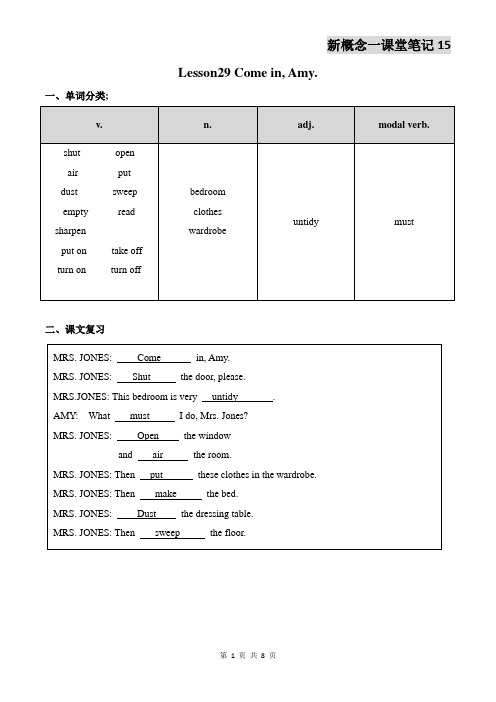
come in
进来
dust the dressing table
给梳妆台除尘
shut the door
关门
sweep the floor
扫地
open the window
开窗
What must I do?
我该做什么?
air the room
给房间通风
put the clothes in the wardrobe
The dustbin is full. Please take the dustbin out andemptyit.
sharpen v.削尖,使...锋利
sharpener n.削笔刀
sharp adj.锋利的
The pencil is blunt.
Get asharpenerandsharpenit.
The floor is dirty, please sweepit.
It’s hot, take offyour coat.
It is dark, turn offthe light.
七、语法练习
1.模仿例句写出相应的祈使句:
Example:The cup isn’t empty.
Empty it!
句型:
肯定句:①Do型:
Look out!/ Stand up! / Shut up!
②Be型:(Be+表语:形容词或名词)
Be careful! பைடு நூலகம் Be yourself! / Be quiet!
③Let型:
Let’s go!我们走!
Let me have a look.让我看一看。
否定句:①Don’t +动词原形
新概念英语第一册第29课
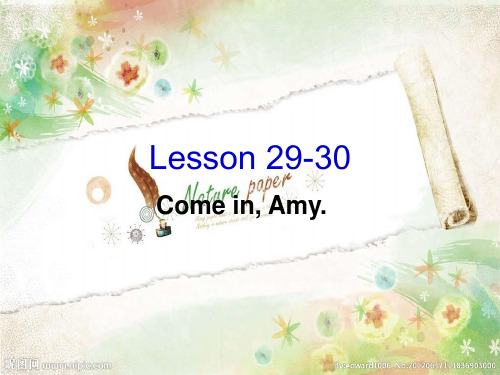
come in shut the door… open the window… air the room… make the bed… dust the dressing table… sweep the floor… put on/take off your clothes… turn on/turn off the stereo… empty the cup… read the magazine… sharpen the knife…
★untidy adj. 乱,不整齐 un-前缀,表示否定;tity adj. 整齐的,干净的 happy——unhappy 不幸福的 lucky——unlucky 不幸的 known——unknown 未知的 ★air v. 使 … 通风,换换空气 ① n. 空气,新鲜空气 Let’s go out and breathe some fresh air. ② n. 空中,空间 He likes to stay in the open air. 他喜欢在户外呆着。 ③ v. 晾(衣服、被褥等);使通风 Leave the trousers on the washing-line to air. 把裤子挂到晾衣绳上去晾干。 ★dust v. 掸掉灰尘土 dust ① v. 掸掉……上的灰尘;② n. 灰尘
衣柜
卧室 关门
打开
使…通风
Hale Waihona Puke 打扫灰尘衣服 不整齐情态动词must的用法: must是情态动词,表示“必须”、“应当” 。 1 情态动词表示人的情感、状态或情绪变化的一种 助动词。 2 情态动词不能单独做谓语,只能和后面的原形动 词一起构成谓语。 3 情态动词没有人称和数格的变化。 4 含有情态动词的句子,否定句在它后面加not, 一般疑问句把它提前。 You must open the window. You mustn't open the window? Must I open the window? Yes, you must. No, you needn't.
新概念英语第一册Lesson_29-30
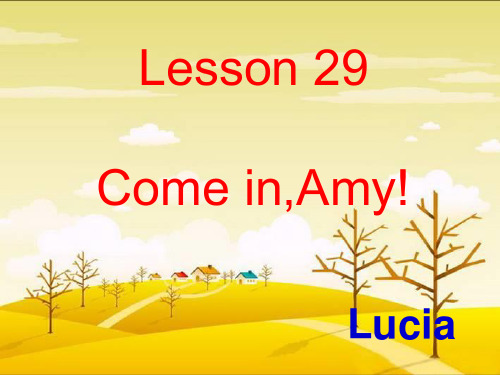
• 1)、must是情态动词。 • 2)、表示必须,不得不做的事情。 • 同时也可以表示不可推卸的责 任。 • 3)、must后面要加动词原型。
• • • • You must do your homework. 你必须写作业。 You must be home at nine. 你必须在九点到家。
table
Empty the
{
cup
bottle
newspaper
Read this
{
magazine
Sharpen these
pencils
Amy is working for you. When she comes to the house, you will be out. Write a list of jobs for Amy. Use some of the verbs from this box.
Open the door. 谓语 开着的(形容词adj.)
• 5.open:打开(动词v.)
• •
•
The door is open. 表语
put on, take off, turn on , turn off的用法
Put on the coat .=Put the coat on. Take off your shoes.= Take your shoes off. Turn on the TV.=Turn the TV on . Turn off the stereo.=Turn the stereo off. put take turn turn sth. on sth. off = sth. on sth.off put on sth. take off sth. turn on sth. turn off sth.
新概念一册Lesson29-30Come in,Amy 进来,艾米
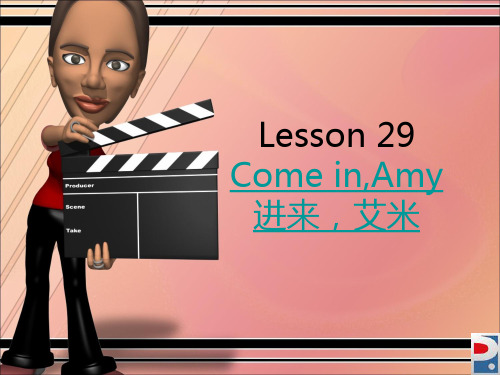
Take off 脱掉
Take off your shoes 脱下你的鞋 =Take your shoes off take them off Take off your tie 摘下领带 =Take your tie off take it off
• Take off your glasses =take your glasses off Take them off
5
What must I do?
ห้องสมุดไป่ตู้
This bedroom's very untidy.
How can we get a clean bedroom?
open the window air the room
put the clothes in the wardorbe make the bed
Turn on 开(接通电源或放水)
Turn on the light 打开灯 =Turn the light on turn it on turn on the tap 打开水龙头 =turn the tap on turn it on
turn off 关(关掉电源,水)
Turn off the lamp 关掉台灯 =turn the lamp off Turn it off turn off the stereo 关掉音响 =turn the stereo off Turn it off
must的用法: 1、must是情态动词。 2、表示必须,不得不做的事情。 同时也可以表示不可推卸的责 任。 3、must后面要加动词原型。 must do (sth)
Lesson 30 What must I do?
我应该做什么?
新概念第一册 Lesson-29-30 Come in, Amy(情态动词)
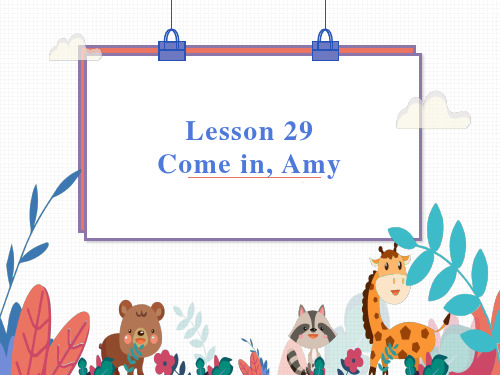
Listen and Answer the question: What color is the electric cooker?
MRS. JONES: Come in, Amy.
MRS.JONES: Shut the door, please.
MRS.JONES: This bedroom’s very untidy.
put on
put on /ˈput ɔn/ 穿上 take off /ˈteɪk ɔːf/ 脱掉
turn
turn on /ˈtɜːn- ɔn/ 开(电灯) turn off /ˈtɜːn-ɔf/ 关(电灯)
What must I do?
What must I do?
What must I do?
Lesson 30 What must I do?
New Words and Expressions
empty /ˈempti/ v. 倒空,使……变空 take off /ˈteɪk ɔːf/ 脱掉
read /ri:d/ v. 读
turn on /ˈtɜːn- ɔn/ 开(电灯)
sharpen / ˈʃɑːpən/ v. 削尖,使锋利 turn off /ˈtɜːn-ɔf/ 关(电灯)
Homework 1. 抄写单词2遍,完成课后习题 2. 熟读L29课
• E.g. Must I sweep the floor? Yes, you must. No, you needn’t. • 我必须扫地吗?是的,你必须这样做。/不,你不需要。
• E.g. Can I borrow this book? Yes, you may./No you may not. 我能借这本书吗?是的,你可以借。/不,你不可以借。
新概念英语第一册Lesson_29-30[1]
![新概念英语第一册Lesson_29-30[1]](https://img.taocdn.com/s3/m/84dbd01359eef8c75fbfb3cd.png)
祈使句
• 祈使句常常是表达说话人对对方的劝告、 叮嘱、请求或命令等。 • 祈使句中一般省略了主语you。 • 在表达请求或劝告时,在祈使句前或句末 可加上please,以使句子的语气更加缓和 或客气。 • Open the window, please. • Come in, please.
祈使句肯定句式:
• dust [dʌst] v. 掸掉 n.灰尘 • dressing table • dust the dressing table.
• sweep [swi:p] v. 扫 • sweep the floor
• Listen to the text, and answer the question. • How must Amy clean the floor?
三、选择题。
• • • • • • ( C)1.The door is open. You must ____ it. A. open B. opens C. shut D. shuts (B )2.Don’t put on this watch. ______. A.Take off it B.Take it off C.Put it on D.Put on it (A )3.That’s ____ nice car and ____colour is nice,too. A.a , its B.a , it’s C.one , it D.an , its (A )4.What must Amy ____? A.do B.does C.doing D.to do ( B)5.Give your book ____ him, please. A.in B.to C.at D.on
• 注:Please可用于祈使句的句首(其后通常 不用逗号)或句末(其前通常用逗号)。如: • Please don’t get angry. 请不要生气。 • Don’t drive too fast,please. 请开得慢一点。
新概念第一册第29课第30课英语课件Lesson29Lesson30

谢谢观赏
have to. • A: Must I finish the work before six? • B: Yes, you must. • No, you needn’t/don’t have to.
• 2.must 的否认形式must not,表制止、绝对不能。 • You mustn’t get to school late. • You mustn’t smoke in the room.
shelf
cupboard
glass
cup
box
newspaper
book
magazine
knife knives
wardrobe
clothes
end table
dressing table
Lesson 29 Come in, Amy.
How must Amy clean the floor? Sweep the floor.
turn on/turn off light open/shut book
Put some sugar in the coffee. Then put these clothes in the wardrobe.
D
B C
E A E D A BC
1)
Open…and air…
2)
Then put…in…
• 3.must后面动词跟原形。
1.She must be at home. (be)
2.When must Amy swee__p__ the floor? (sweep)
3.— Must they clean the classroom now?
— No, they B
新概念1 lesson 29-30 come in , amy

句型转换。
• 1.Shut the door. (变同义句) _D__on_’_t _c_lo_s_e_ the door.
• 2.This bedroom is tidy. (变为反义句)
• This bedroom is u_n_ti_d_y.
• 3.You must air the room. (变为同义祈使句)
一、英译汉,汉译英。
1. sharpen
2.读
3. shut
4.卧室
5. must
6.乱,不整齐
7. wardrobe
8.开(电灯) 9. empty
10.打开
11. air
12.放置
13.衣服
14.dust
15.sweep
16.穿上
17.take off 18.关(电灯)
做以下题目认真,全对方可点击抽奖
祈使句的否定形式
1. Do型和Be型的否定式都是在句首加don't 构成。 Don’t do sth. / Don’t be …
Don't forget me! 不要忘记我! Don't be late for school! 上学不要迟到!
2. Let型的否定式有两种: Don’t let sb do sth. / Let sb not do sth.
第三章
grammer
祈使句(Imperative Sentence)
定义:用于表达命令、请求、劝告、警告、禁止等 的句子叫做祈使句. 祈使句因对象(即主语)是第二人称,所以通常都省略。 祈使句的动词都为一般现在时,句末则使用句号来表示结束。
祈使句的肯定结构
1. Do型(即:动词原形(+宾语)+其它成分)。 Please have a seat here. 请这边坐。
- 1、下载文档前请自行甄别文档内容的完整性,平台不提供额外的编辑、内容补充、找答案等附加服务。
- 2、"仅部分预览"的文档,不可在线预览部分如存在完整性等问题,可反馈申请退款(可完整预览的文档不适用该条件!)。
- 3、如文档侵犯您的权益,请联系客服反馈,我们会尽快为您处理(人工客服工作时间:9:00-18:30)。
新概念英语第一册第29-30课:Come in,Amy
Lesson 29 Come in, Amy.进来,艾米。
听录音,然后回答问题。
艾米需要如何来清扫地面?Come in, Amy.
琼斯夫人:进来,艾米。
Shut the door, please.
琼斯夫人:请把门关上。
This bedroom is very untidy.
琼斯夫人:这卧室太不整洁了。
What must I do, Mrs. Jones?
艾米:我应该做些什么呢,琼斯夫人?
Open the window and air the room.
琼斯夫人:打开窗子,给房间通通风。
Then put these clothes in the wardrobe.
琼斯夫人:然后把这些衣服放进衣橱里去。
Then make the bed.
琼斯夫人:再把床整理一下。
Dust the dressing table.
琼斯夫人:掸掉梳妆台上的灰尘。
Then sweep the floor.
琼斯夫人:然后扫扫地。
New Word and expressions 生词和短语
shut
v. 关门
bedroom
n. 卧室
untidy
adj. 乱,不整齐
must
modal verb 必须,应该
open
v. 打开
air
v. 使… 通风,换换空气
put
v. 放置
clothes
n. 衣服
wardrobe
n. 大衣柜
dust
v. 掸掉灰尘土
sweep
v. 扫
Notes on the text课文注释 1 英文中需用祈使语气来表示直接的命令、建议、告诫、邀请等多种意图。
祈使句一般省略主语you
动词采用动词的原形。
如本课对话中的Come in, shut the door. open the window…等均为祈使句。
2 What must I do?我应该做些什么呢?其中的must是情态动词,表示不可逃避的义务或不可推卸的责任。
3 make the bed 铺床。
Lesson 30 What must I do?我应该做什么?
New Word and expressions 生词和短语
empty
v.倒空,使…变空
read
v.读
sharpen
v.削尖使锋利
put on
穿上
take off
脱掉
turn on
开(电灯)
turn off
关(电灯)
Lesson 29-30 自学导读First things first
1.untidy 乱,不整齐。
un-是前缀,表示"not"这类否定的意思。
2.air the room 给房间通通风。
这里的air作动词用。
名词作动词用是英语构词法的一种。
又如:dust (n.)灰尘;(v.)掸掉灰尘。
语法 Grammar in use
must
must是一个情态助动词,表示"必须"、"应当",与have to相似,表示不可逃避的义务。
在说话人看来,没有选择余地。
但是,must带有个人色彩,表示说话人的主观意图。
表示个人感情时通常用must。
You must…(你必须……)表示说话人说/认为……是必要的。
如:
You must sweep the floor.
你必须扫地。
(我说这有必要)
词汇学习 Word study
1.air
(1)n.空气,新鲜空气:
Let's go out and breathe some fresh air.
咱们出去呼吸点新鲜空气吧。
(2)n.空中,空间:
He likes to stay in the open air.
他喜欢在户外呆着。
(3)v.晾(衣服、被褥等);使通风:
Open the windows and air the room.
打开窗户使房间通风。
Leave the trousers on the washing-line to air.
把裤子挂到晾衣绳上去晾干。
2.empty
(1)v. 使空;把…倒出(移出):
Empty the bottle of milk.
倒光瓶里的牛奶。
They emptied the house.
他们把房屋搬空了。
(2)v. 流出;走出:
The river emptied itself into the sea.
河水流入大海。
It was raining, and the streets began to empty.天下起了雨,街上的行人开始稀少了。
(3)adj. 空的:
There are some empty bottles in the refrigerator.冰箱里有一些空瓶子。
Her purse is empty.
她的钱包是空的。
(4)adj. 空虚的,无意义的:
It's an empty dream.
这是个不现实的梦想。
Officials were flattered by empty complements.官员们被空洞的恭维话弄得心里美滋滋的。
(5)adj. 呆板的,毫无表情的:
She looked at him with empty eyes.
她木然地看着他。
He said all this in an empty voice.
他用一种呆板的声调说了这一切。
